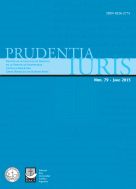Por favor, use este identificador para citar o enlazar este ítem:
https://repositorio.uca.edu.ar/handle/123456789/2843| Título: | El estado de derecho contra el estado de codicia : Edmund Burke contra la Compañía Británica de las Indias Orientales The rule of law against the state of greed : Edmund Burke against the East India Company |
Autor: | Fortunat Stagl, Jakob | Palabras clave: | ESTADO DE DERECHO; DERECHO NATURAL; COLONIALISMO; RACISMO; DERECHO ROMANO | Fecha de publicación: | 2015 | Editorial: | EDUCA Universidad Católica Argentina. Facultad de Derecho |
Cita: | Stagl, J. F. El estado de derecho contra el estado de codicia : Edmund Burke contra la Compañía Británica de las Indias Orientales [en línea], Prudentia Iuris. 2015, 79. Disponible en: https://repositorio.uca.edu.ar/handle/123456789/2843 | Resumen: | Resumen: ia finales del siglo XVIII, Bengala cayó repentinamente bajo el gobierno de la Compañía Británica de las Indias Orientales. En un primer momento, esta última se convirtió en el soberano de un país del tamaño de Francia, para pasar, finalmente, a ser el de todo el subcontinente indio. La Compañía no estaba controlada por ningún Derecho Positivo, ni indio, ni británico, ni internacional. Como resultado, la codicia individual y corporativa de la Compañía reinó de manera suprema, con las consecuencias más nefastas que se puedan imaginar para la población nativa de la India. El problema de la India despertó el interés de Edmund Burke. Él vio en India una metáfora de su natal Irlanda y sospechó de la corrupción de los políticos británicos, a causa del dinero y la influencia que los hombres de la Compañía ganaron en India. Como consecuencia, hizo de la lucha contra la avaricia desmedida de la Compañía (mediante la promoción de un juicio político a Warren Hastings, el primer gobernador general de Bengala) el objetivo de su vida. Sin embargo, para conseguir que condenasen a Hastings, era necesario probar que él había infringido la ley. Pero ¿qué ley deberían aplicar los jueces? Para ello, Burke recurrió al Derecho Natural y al Derecho Romano. De esta forma, blandió la máxima “Eundem negotiatorem et dominum”, que quiere decir, que aquel negocio que tiene por objetivo generar ganancias es irreconciliable con aquel que tiene por objetivo el bienestar de la población. A pesar de ello, luego de muchos años, Hastings fue absuelto. Empero, con este juicio, Burke contribuyó a civilizar el gobierno británico en India. Recientemente la escuela postcolonialista ha criticado la postura de Burke. Según esta escuela, Burke debería haber pedido a Gran Bretaña dejar India, en lugar de mejorar su gobierno y, como consecuencia, prolongar su existencia. Abstract: At the end of the 18th century Bengal suddenly came under the rule of the East India Company. The former trading company had become the sovereign, first, of a country the size of France, and eventually of the whole Indian subcontinent. The Company was not controlled by any positive law, be it Indian, British or international. As a consequence, the Company’s individual and corporate greed reigns supreme, with the most dire consequences for the native Indian population. The Indian question aroused the interest of Edmund Burke. He saw in India a metaphor for his native Ireland and was suspicious of the corruption of British politics by the money and influence that the Company’s men had gained in India. He therefore made it the aim of his life to fight the Company’s unrestrained avarice by fostering an impeachment trial against Warren Hastings, the first Governor General of Bengal. In order to get Hastings convicted it was necessary to show that he had infringed the law. But which law should Hastings’ judges apply? He resorted to Natural Law and Roman Law. Thence he took the maxim “Eundem negotiatorem et dominum”, that is to say, commerce which aims at profit, and government which aims at the welfare of the population, are irreconcilable. Though after many years Hastings was acquitted, Burke contributed by this trial to civilizing British rule in India. Burke’s stance has recently been criticised by the post-colonial school: He should have pleaded for the British to quit India rather than improving their rule and thereby prolonging its existence. |
Cobertura Espacial: | SIGLO XVIII | URI: | https://repositorio.uca.edu.ar/handle/123456789/2843 | ISSN: | 0326-2774 | Disciplina: | DERECHO | Derechos: | Acceso Abierto | Fuente: | Prudentia Iuris, 79, 2015 ISSN 0326-2774 |
| Aparece en las colecciones: | PI - 2015 nro. 79 |
Ficheros en este ítem:
| Fichero | Descripción | Tamaño | Formato | |
|---|---|---|---|---|
| estado-derecho-estado-codicia.pdf | 428,83 kB | Adobe PDF |  Visualizar/Abrir |
Visualizaciones de página(s)
491
comprobado en 30-abr-2024
Descarga(s)
415
comprobado en 30-abr-2024
Google ScholarTM
Ver en Google Scholar
Este ítem está sujeto a una Licencia Creative Commons

